

Apò mēkhanḗs theós. 100th Meme Keys. LogicKo. Grok Ko. Problem Solving & Decision-Making Thinking Skills. Critical Thinking. Outline of thought. Nature of thought[edit] Thought (or thinking) can be described as all of the following: An activity taking place in a: brain – organ that serves as the center of the nervous system in all vertebrate and most invertebrate animals (only a few invertebrates such as sponges, jellyfish, adult sea squirts and starfish do not have a brain).
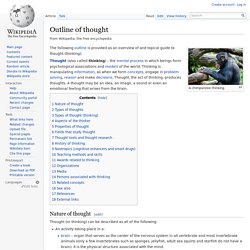
It is the physical structure associated with the mind. mind – abstract entity with the cognitive faculties of consciousness, perception, thinking, judgement, and memory. Intelligence analysis. Intelligence analysis is the process of taking known information about situations and entities of strategic, operational, or tactical importance, characterizing the known, and, with appropriate statements of probability, the future actions in those situations and by those entities.
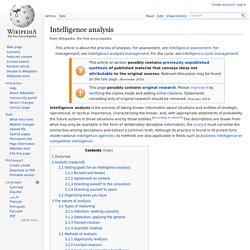
[according to whom?] The descriptions are drawn from what may only be available in the form of deliberately deceptive information; the analyst must correlate the similarities among deceptions and extract a common truth. Although its practice is found in its purest form inside national intelligence agencies, its methods are also applicable in fields such as business intelligence or competitive intelligence. Overview[edit] Lord et al: Prior Bias and Attitude Change- Death Penalty.
Lord, C., Ross, L., & Lepper, M., Biased Assimilation and Attitude Polarization: The effects of Prior Theories on Subsequently Considered Evidence.
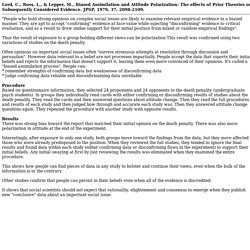
JPSP, 1979, 37, 2098-2109. "People who hold strong opinions on complex social issues are likely to examine relevant empirical evidence in a biased manner. They are apt to accept "confirming" evidence at face value while sujecting "disconfirming" evidence to critical evaluation, and as a result to draw undue support for their initial position from mixed or random empirical findings". Thus the result of exposure to a group holding different views can be polarization This result was confirmed using two variations of studies on the death penalty.
Often opinions on important social issues often "survive strenuous attempts at resolution through discussion and persuation". Procedure Based on questionnaire information, they selected 24 proponents and 24 opponents to the death penality (undergraduate psych students). Transcendence. Lateral thinking. Lateral thinking is solving problems through an indirect and creative approach, using reasoning that is not immediately obvious and involving ideas that may not be obtainable by using only traditional step-by-step logic.

The term was coined in 1967 by Edward de Bono. [1] According to de Bono, lateral thinking deliberately distances itself from standard perceptions of creativity as either "vertical" logic (the classic method for problem solving: working out the solution step-by-step from the given data) or "horizontal" imagination (having many ideas but being unconcerned with the detailed implementation of them).
Methods[edit] Critical thinking is primarily concerned with judging the true value of statements and seeking errors. Lateral thinking is more concerned with the "movement value" of statements and ideas. Random Entry Idea Generating Tool: The thinker chooses an object at random, or a noun from a dictionary, and associates it with the area they are thinking about. Thinking tools resources. Weak versus Strong Critical Thinking Critical thinking involves basic intellectual skills, but these skills can be used to serve two incompatible ends: self-centeredness or fair-mindedness.
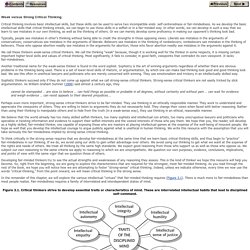
As we develop the basic intellectual skills that critical thinking entails, we can begin to use those skills in a selfish or in a fair-minded way. MindMap: Systems Thinking Skills. How to Understand Everything (and why) — Metamodern. Too much to know, lots to know about In science and technology, there is a broad and integrative kind of knowledge that can be learned, but isn’t taught.
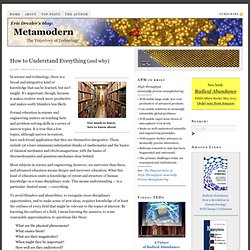
It’s important, though, because it makes creative work more productive and makes costly blunders less likely. Formal education in science and engineering centers on teaching facts and problem-solving skills in a series of narrow topics. It is true that a few topics, although narrow in content, have such broad application that they are themselves integrative: These include (at a bare minimum) substantial chunks of mathematics and the basics of classical mechanics and electromagnetism, with the basics of thermodynamics and quantum mechanics close behind. Most subjects in science and engineering, however, are narrower than these, and advanced education means deeper and narrower education. What are the physical phenomena? Standards-Elements-Traits. Critical Thinking Model 1. To Analyze Thinking We Must Identify and Question its Elemental Structures Standard: Clarityunderstandable, the meaning can be grasped Could you elaborate further?
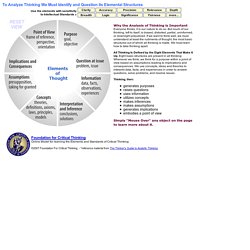
Could you give me an example? Vendiagram creative/critical thinking. Critical thinking. Critical thinking model and mods. Critical and Creative Thinking - Bloom's Taxonomy. A Mini Guide to Critical Thinking. Of a sequence of words is determined by its grammatical properties andthe meanings that are conventionally assigned to those words.
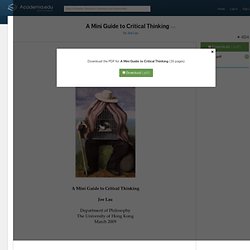
The literalmeaning of a statement should be distinguished from its conversationalimplicature - the information that is implicitly conveyed in a particular conversational context, distinct from the literal meaning of the statement.For example, suppose we ask Lily whether she wants to go to the cinemaand she replies, "I am very tired. " Naturally we would infer that Lily doesnot want to go to the cinema. But this is not part of the literal meaning of what is said. Rather, the information that she does not want to go isinferred indirectly. Similarly, suppose we hear Lala says, "Po likes books".We might perhaps take Lala to be saying that Po likes to read. Critical Thinking: Where to Begin. The Critical Thinking Consortium - Home. Think Complexity. By Allen B.
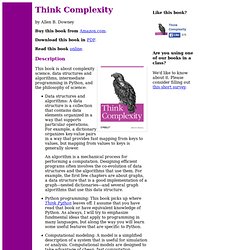
Downey Buy this book from Amazon.com. Download this book in PDF. Read this book online. Description This book is about complexity science, data structures and algorithms, intermediate programming in Python, and the philosophy of science: Think Complexity. Pensée complexe. Encyclopedia of Philosophy. Scripps Climate Researcher among 100 Foreign Policy Global Thinkers of 2014. Foreign Policy magazine has named Veerabhadran Ramanathan, a distinguished professor of climate and atmospheric sciences at Scripps Institution of Oceanography, UC San Diego, as one of its 100 Leading Global Thinkers of 2014.

Ramanathan has over the course of more than 40 years achieved several breakthroughs in the understanding of the effects of aerosols – particularly air pollution – on climate. In recent years, he has advanced the control of what are termed short-lived climate pollutants as a means of slowing the advance of global warming in the near term. He has also advocated for religious leaders to take up the cause of environmental stewardship as a moral imperative and interacted with figures such as the Dalai Lama and Pope Francis toward this end. His efforts have included the co-authoring of several essays intended for the international diplomatic community on ways to achieve success in combating climate change.
Bengali Association of Victoria. There is perhaps only one litterateur who penned anthems of two countries: India and Bangladesh: Jana Gana Mana and Amar Shonar Bangla. This alone amply shows how big the name Rabindranath Tagore is. Some people tell Bengalis live and breathe Rabindranath. It is often a matter of research as how Bengalis would have been if Rabindranath were not there. Rabindranath Tagore (sobriquet Gurudev) was a poet, novelist, musician, painter, playwright and educationist; who reshaped Bengali culture and created a lasting impact on Bengali psyche. His literature and educational reforms inspired many future generations in India and Bangladesh. James Randi Educational Foundation. Top 30 think tanks in the world 2011. Edge : Conversations on the edge of human knowledge.
Philosophy of Mind. Cognitive Dissonance. Explanations > Theories > Cognitive Dissonance Description | Research | Example | So What? | See also | References Description This is the feeling of uncomfortable tension which comes from holding two conflicting thoughts in the mind at the same time. Dissonance increases with: The importance of the subject to us. Sensemaking. Logical Fallacies: The Fallacy Files. List of fallacies. A fallacy is incorrect argument in logic and rhetoric resulting in a lack of validity, or more generally, a lack of soundness. Fallacies are either formal fallacies or informal fallacies. Formal fallacies[edit] Main article: Formal fallacy Appeal to probability – is a statement that takes something for granted because it would probably be the case (or might be the case).[2][3]Argument from fallacy – assumes that if an argument for some conclusion is fallacious, then the conclusion is false.Base rate fallacy – making a probability judgment based on conditional probabilities, without taking into account the effect of prior probabilities.[5]Conjunction fallacy – assumption that an outcome simultaneously satisfying multiple conditions is more probable than an outcome satisfying a single one of them.[6]Masked man fallacy (illicit substitution of identicals) – the substitution of identical designators in a true statement can lead to a false one.
Propositional fallacies[edit] 15 styles of Distorted Thinking. 15 styles of Distorted Thinking Filtering: You take the negative details and magnify them while filtering out all positive aspects of a situation. Polarized Thinking: Things are black or white, good or bad.
You have to be perfect or you're a failure. There is no middle ground. List of memory biases. In psychology and cognitive science, a memory bias is a cognitive bias that either enhances or impairs the recall of a memory (either the chances that the memory will be recalled at all, or the amount of time it takes for it to be recalled, or both), or that alters the content of a reported memory. List of cognitive biases. Cognitive Biases.
50 Common Cognitive Distortions. 3. Negative predictions. Overestimating the likelihood that an action will have a negative outcome. 4. Underestimating coping ability. Top 10 Common Faults In Human Thought. Humans The human mind is a wonderful thing. Cognition, the act or process of thinking, enables us to process vast amounts of information quickly. How to Determine If A Controversial Statement Is Scientifically True. The Fine Art of Baloney Detection. It makes your head spin. "The Fine Art of Baloney Detection"[1] is an essay by Carl Sagan in his seminal work against pseudoscience, The Demon-Haunted World. Identify a Lie with 6 Simple Questions. Post written by: Marc Chernoff Email. The History of Human Thinking (in 6 minutes, 4 seconds) A World Disrupted: The Leading Global Thinkers of 2014. Human thinking. Creative thinking.pdf. Creative Thinking - Exercises.
Thinking Map. Yoga & Magical Thinking: A Defense. Lets face it, when it comes to magical thinking, yoga people are some of the worst perpetrators around. Author and yogi Matthew Remski is right on the money when he observes “the facebook status updates that define yoga culture can be summed in one line. As I think so I shall be”. And while this idea is often attributed to no greater mind than the Buddha – we’ve got to get a grip. Wishing for something does not make it so. Because according to scientific arbiters of reality, treating the physical world as though it had mental properties and treating the mental world as though it had physical properties – is to be guilty of “cognitive dysfunction.”
To believe in the “powers of intention” is to have fallen victim to the fallacy that consciousness extends beyond the brain. The idea we can alter matter with our thoughts may have been a self-evident truth for ancient yogic sages like Patanjali – but today, we know better. Technologies of Qi – Energy Flows Where Attention Goes. How to Think Like a Genius. Edit Article. How to think like Leonardo da Vinci. Think Like a Doctor (The Contest) Esoteric Endeavors. New Learning. Wisdom. Philosophikos. Polymath Renaissance. LEARNING.
Mind Into Matter. Systems Thinking. Systems Thinking. Visual Thinking. Think. Think. Critical Thinking. Critical Thinking. Critical Thinking. Critical Thinking. Critical Thinking. Critical Thinking.